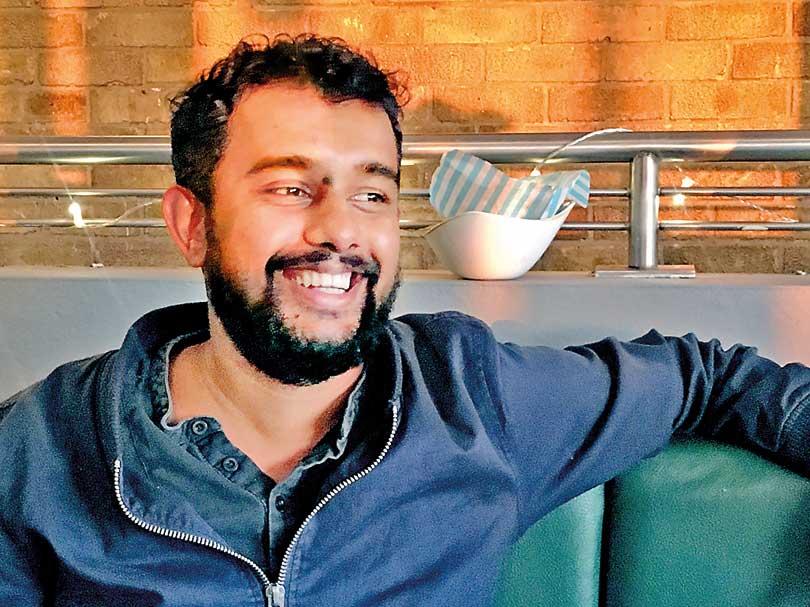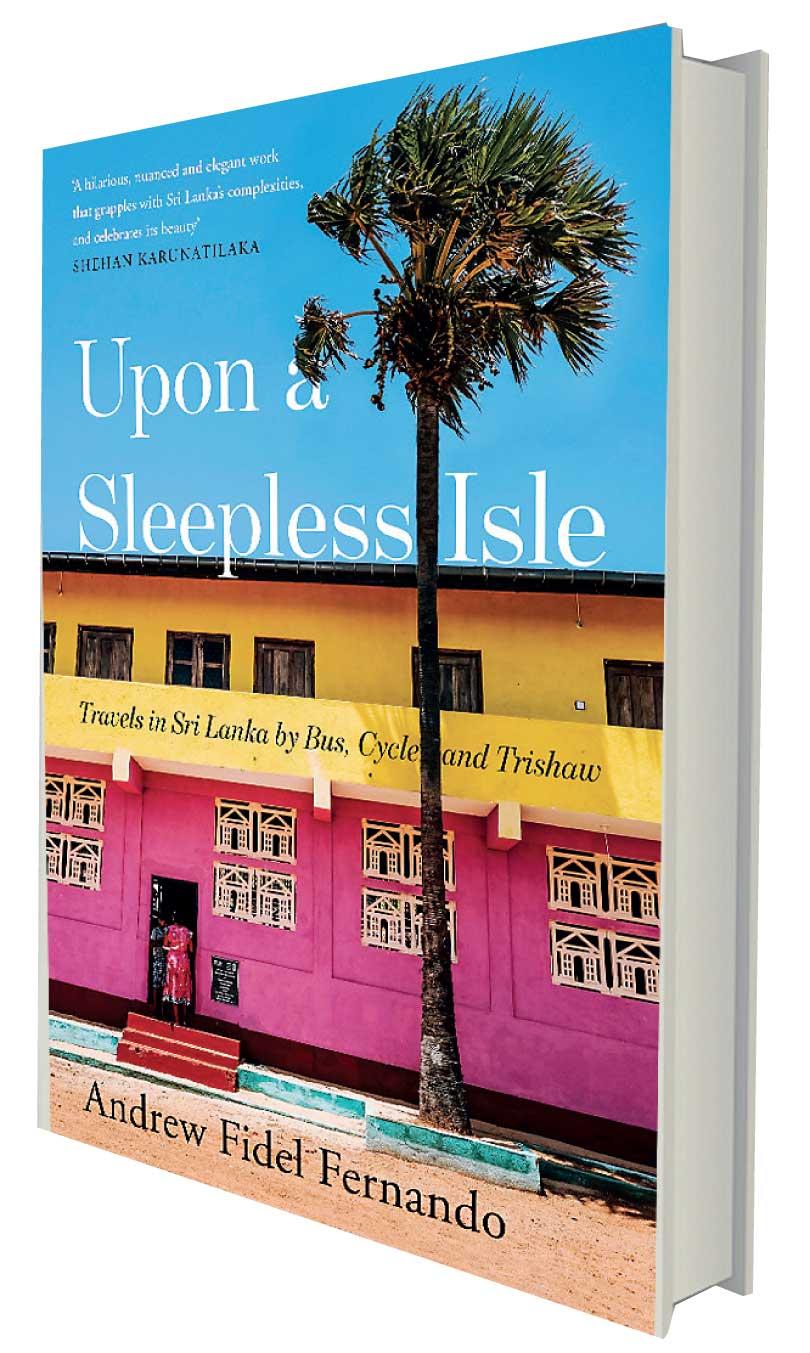Reply To:
Name - Reply Comment
Last Updated : 2024-04-20 09:39:00

Andrew Fidel Fernando
 It would be rather unlikely of a cricket enthusiast in Sri Lanka to be unfamiliar with the name Andrew Fidel Fernando. Be it on account of his well-worded cricket updates or the early morning mumblings on a popular radio programme, Andrew is the country’s go-to cricket writer par excellence.
It would be rather unlikely of a cricket enthusiast in Sri Lanka to be unfamiliar with the name Andrew Fidel Fernando. Be it on account of his well-worded cricket updates or the early morning mumblings on a popular radio programme, Andrew is the country’s go-to cricket writer par excellence.
So noteworthy is his writing, that not too long ago, while compiling a sports update for a news bulletin, a senior colleague bellowed in my general direction across the newsroom: “For heaven’s sake, don’t read Andrew’s report!” As I ventured a quizzical look, the colleague replied, “He’s a great writer, but he’s not helping us get the bulletin done on time!” This of course was true, as I often found myself hooked to Andrew’s lengthy commentaries instead of compiling the news bulletin.
It was with some apprehension that I picked up ‘Upon a Sleepless Isle’, mostly because travel writing is far less enjoyable, but also because I was confused, ‘why would he write a travelogue?’ Perhaps one of his memorable articles published in The Cricket Monthly titled ‘Left-arm lovable’ in 2016, a moving account of Rangana Herath’s career, should have been an indication of his narrative capabilities. Despite my knowledge of this potential, however, to say that the first few pages forced me to bite my words is an understatement.
‘Upon a Sleepless Isle’ is by no measure your ordinary travelogue. It is the all-encompassing narrative potpourri of curiosities and complexities that make the island of Sri Lanka. Served with spiced Lankan witticisms, devilish detail, generous servings of humour and a side of history, the book can be easily devoured in a matter of days, owing to Andrew’s casual, succinct and witty writing.
Unlike most accounts on travel, Andrew begins his journey of eight weeks around the island “by bus, cycle and trishaw” with the most unassuming and dull of places, where he tries to obtain his national identity card from a government office in Dehiwala. What follows is a brief description of a routine visit to any state service in Sri Lanka, where you are most likely treated to a never-ending thread of inept officers and the most ridiculous bureaucracies. Though Andrew is offered the same treatment, his observations of the state machinery are ripe with savage detail, which sets the tone for the book forthrightly relatable to any Lankan reader. He goes on to pen the reasoning behind his six week adventure, one which most of his generation are all too familiar with.“I had been a child of the wartime years, when bombs exploding within earshot of our home had inspired a deep-seated dread of travel within my parents. Even if we did venture a brief journey, half-a-dozen military checkpoints seemed to stand between the front door and the gate.” A decade since the end of the war, these sentences tug at the heartstrings, for Andrew’s wish to no longer be a stranger to the delights of his own country resonates with hundreds of youth born into conflict across the island.
The most striking feature of this book would be the nuggets of history, woven into the narrative in seamless perfection. The book provides reconnaissance of one’s own knowledge of the island’s history, and in my case, the illuminating juxtaposition of what was learned through a history text book in school versus the accounts of actual historians. Hailing from Kandy myself, reading the rarely discussed truths about the conservative hill capital left an aftertaste and a revisit to the old prudish, moralistic way of life back home. But that’s not all Kandy offers the writer, as he tumbles downhill, off the winding roads, out of a trishaw -- undoubtedly serious and scary -- but told in witty detail. What follows is a favoured paragraph where the writer notes a realisation: “Like the stay in Kandy, the night had been a showcase of the nation’s extremes… But in her own fashion, the island almost always finds a way of redeeming herself, even if only partially, but in the most unlikely and warming ways”.
As Andrew makes his way through the island, he visits his relatives in Dambadeniya. His stay encompasses, according to Andrew, fresh air, exercise, breaking a cardinal rule of provincial living, a treat to aappa and coconut toddy, intrusive pirith chanting and a re-introduction to the island’s ironies. From hardline, coercive Buddhism to discrimination in various forms, the author is unable to reconcile the laid-back country life with the underlying passive-aggression as he continues with his journey.

Another gratifying feature of the book is the various characters the reader is introduced to. From chatty Dhammika in Habarana, to optimistic Gopi in Jaffna and of course Andrew’s own grandmother who makes very important cameo appearances, they paint a detailed picture into the diurnal happenings of our island nation, while peeling layers off each community, wide enough for the reader to glimpse through. The writing on our teardrop island has mostly been limited to a predictable post-war snapshot of Sri Lanka, through interactions, interviews and observing the lives of ordinary people. Although Andrew does exactly that, his take on our Sri Lanka is much more. It is certainly refreshing to read the thoughts and findings on Sri Lanka from someone who knows the island’s history and make-up as intimately as he does. Characters such as Mr. Meiyanathan for instance offer both local and international readers an honest and grim reality of how that famous cup of Ceylon tea is made. The lengths the writer travels to find out these intrepid details is admirable.
There are instances where you begin to understand why the word ‘sleepless’ fits the title. The book is about his travels, but also about people, government, corruption, religion and conflict. In all seriousness of observation, the writer attempts to salvage some sobering truths that leave the heart heavy for a local reader, with humour. However here, his attempts fail. The truth he pens outweighs the need for such lightness.
The book takes us through an ironic and complex state of affairs of an island caught between tradition, conflict and paradise. Wit and sarcasm reign, sometimes so powerful to the extent of attracting wayward glances from passersby if you happen to read this book in public. Some descriptions heighten the school-boy take on humour, such as the detailed reproductive behaviour of a herd of elephants in Minneriya, written with unparalleled enthusiasm. And if questioned by those around you as to why you laugh, you’re most likely to have no other explanation than, “you have to read this book.” In other instances the humour is a bit more laboured, nevertheless affable, and similar to the jokes stereo-typically cracked by the father of a family. Andrew also uses dialogues of different English accents and dialects, which adds to the quality of humour. To incorporate these hilarious nuggets as and how they were experienced, into a work of literature is by no means an easy task, but it comes through effortlessly.
It’s best left for the reader to discover who exactly made the writer feel unwelcome in Polonnaruwa or what history lesson an ice-cream vendor had to offer him. All instances, unpredictable, hilarious and informative down to the piffling details of post war Sri Lanka, such as the yearning for praise of this complex country. Whatever your reason may be to pick up this book, ‘Upon a Sleepless Isle’ guarantees a journey to reconnect with our beautiful island home.
Published by Picador - Pan Macmillan, India 243 pages

Add comment
Comments will be edited (grammar, spelling and slang) and authorized at the discretion of Daily Mirror online. The website also has the right not to publish selected comments.
Reply To:
Name - Reply Comment
On March 26, a couple arriving from Thailand was arrested with 88 live animal
According to villagers from Naula-Moragolla out of 105 families 80 can afford
Is the situation in Sri Lanka so grim that locals harbour hope that they coul
A recent post on social media revealed that three purple-faced langurs near t